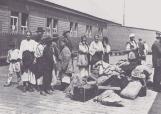1
Mary Kozak tells the story of her immigration to Canada.2
I was born in the village of Kopytovo, Sokal Region, Lviv Province. My parents were well-to-do peasants. My father used to hire women from the village of Bobiatyn during the harvest to work for us. We ourselves didn't have to work in the fields of the lord of the manor. There were four children in the family.My father was not only a good farmer; he was also a good tailor. He was hard-working and diligent. All the same, his approach to inheritance was feudal in character and he didn't want to fragment his property. For this reason he sent me to Canada.
I had six years of schooling. My father would have had me become a teacher, but I wasn't at all enthusiastic, finding the idea of leaving my native village to teach elsewhere not very attractive, in fact, quite frightening.
One day, my father went to Sokal, had an interview with the agent of the steamship line and made arrangements for my passage to Canada. He had done this without my knowledge. I was nineteen years of age at the time.
I set out on my journey with two other local girls. I had enough money - besides the steamship ticket, I also had fifty dollars for the necessary warranty. In fact, all they asked for at that time was twenty-five dollars. We had a wait of two weeks in Hamburg, where I spent five dollars. Then we went on to England and sailed from Liverpool to New York. Here we had to go through the controls and show our twenty-five dollars.
My two companions didn't have enough money: Natalka Pavliuk had nine dollars and Zoska Mahera had seven dollars. I gave each one of them ten dollars. Another girl who was travelling with us was five dollars short of the required amount and was crying bitterly because the authorities wanted to send her back to the old country. I felt sorry for her and gave her the five dollars.
So I was left with twenty dollars. And then they wouldn't let me go on either. My companion, Natalka, dispatched a telegram to her father in Port Arthur and he sent her some money. She paid back what she owed me and I was allowed to enter Canada. As for Zoska, I told her not to worry because I would send her the money she needed as soon as I arrived at my destination in Canada.
I was supposed to go to Winnipeg, to Harry Rybka, but I never reached my destination. Natalka stopped in Port Arthur because her father was there. Some young men who had come to the station began persuading me to stop in Port Arthur and not continue to Winnipeg.
It seems that there was a shortage of Ukrainian girls there. These were strapping young men who had left the old country to escape the military draft. Two young fellows got on the train and started to persuade me until I agreed to stay in Fort William. Already living in Port Arthur were, among others, our fellow-villagers Pavliuk, Soloviy and Horbal. Talking with these people, I didn't miss my native village anymore.
However, I must add that the attitude of some of our villagers was anything but cordial. They asked me why I had come to Canada when I was comfortably off in the old country. Such behaviour on their part offended me.
I didn't write to my father for two years, whereas I did correspond with some of my relatives in the village. I felt hurt because my father had simply sent me away to Canada. However, I should admit that he did write to me, saying that he would bring me back to the old country if conditions proved too unpleasant for me in Canada. I was stubborn and resolved not to go back, no matter what, after having been sent away like that by him.
In Port Arthur, I worked as a housemaid in a Jewish home. I was supposed to be paid twelve dollars a month. But I stayed there less than a month. These were cheap people who wanted to set up a provocation, to blacken me, to make me out a "thief". I left their employ without even taking any pay for my work. I felt very insulted.
I then went to the Labour Exchange and took a job in a private home in Nipigon, Ontario. I was paid twenty dollars a month. I thought to myself: "What difference does it make where I find myself? I'm a stranger no matter where I am." And so I went to Nipigon where I stayed for two months. This was a small town with two hotels, one general store and a post office. I felt very sad: there wasn't a single Ukrainian person living there, no one with whom I could speak in my own language. Just see where I ended up! It's impossible to say now what I went through during those two months in Nipigon.
I returned to Fort William where an acquaintance of mine, Eva Oliynyk, found a job for me at the Empire Hotel. I washed dishes and scrubbed the kitchen floor. What else could I do? I was paid twenty dollars a month and was given room and board. I worked there for half a year. Then I got a job as second cook at the Alexander Hotel in West Fort William. Having acquired some experience and having learned some English, I went to Port Arthur where I got a job as a waitress in a restaurant.
MARY KOZAK
WINDSOR, ONTARIO
interview by Peter Krawchuk
3
A group of Ukrainian immigrants wait for their train to the WestApril 1896
 Credits:
Credits:National Archives of Canada